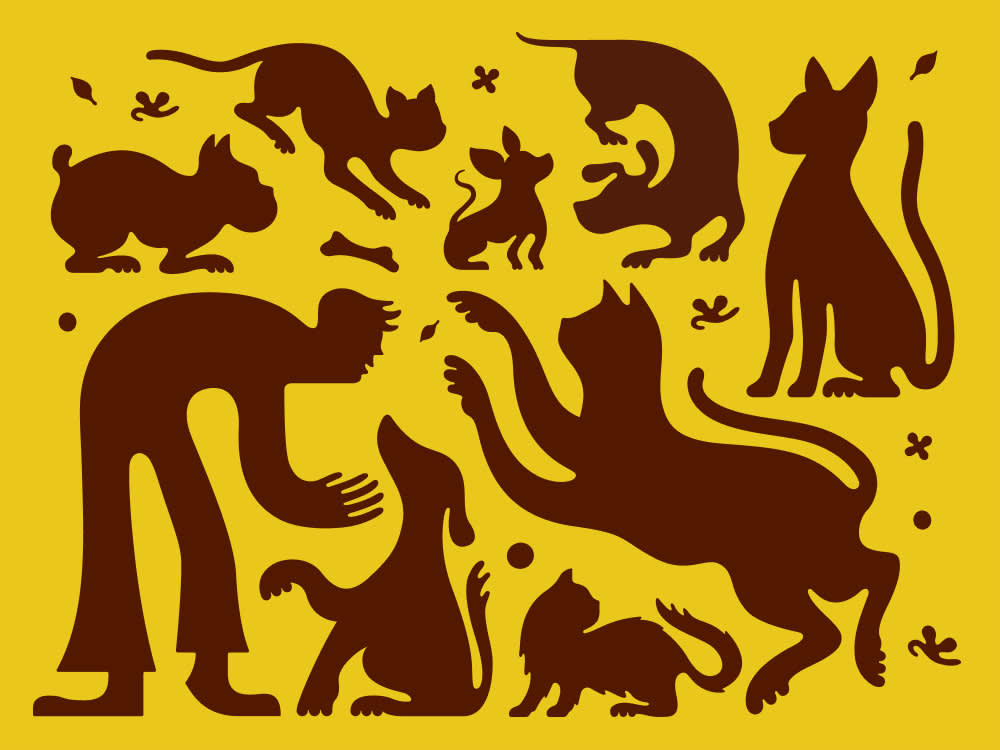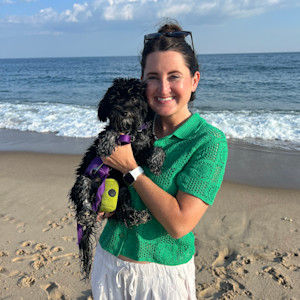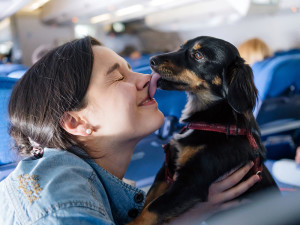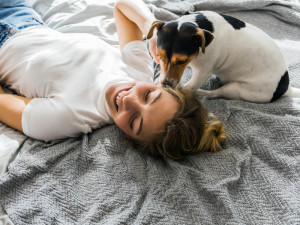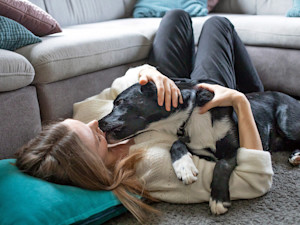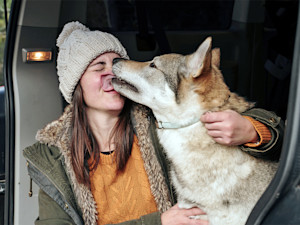What Happens to Your Skin When Your Dog Licks You a Lot?
Find out if you need to adjust your skincare routine.
“Gimme a kiss, gimme a kiss,” is probably the command I use most often with my dog. Briar, my 12-pound, two-year-old Havanese, is a little ball of love who would happily spend her entire day licking my husband’s and my face. And to be honest, we let her.
But after a particularly enthusiastic smooch session one morning, I started wondering: Is all this licking doing something weird to my skin? I’ve struggled with acne and eczema for years, and I rarely wash my face after Briar licks me. Could her kisses be making my skin worse? And if so, what should I do? Cut her off, or just adjust my skincare routine? I needed to investigate.
First of all, why do dogs lick your face so much?
There are a bunch of reasons your dog might be obsessed with licking your face (and arms, and legs, and hands). For one, licking is one of the main ways dogs show affection and connect with their humans. It’s an instinct that starts in puppyhood when they lick their moms and littermates for comfort and bonding, and it often sticks around as they grow up.
So when your pup goes in for a big slobbery kiss, they’re probably saying “I love you,” “I’m excited to see you,” or even “You’re the boss.” It can also be their way of getting your attention or copying the grooming habits they’d use with other dogs. In a lot of ways, licking is a sweet little social ritual, and for many dogs, it’s just how they show they care.
How much do you spend on your pet per year?
That being said, it’s not always just about love. Sometimes, it can be about what’s actually on your skin. “Skincare, makeup, sweat, or shower-fresh skin all smell and taste interesting to [dogs],” explains Ezra Ameis, DVM, a Los Angeles-based emergency veterinarian and founder of Paw Priorityopens in new tab in West Hollywood. Licking can also be driven by anxiety, boredom, or learned behavior that’s been reinforced over time (um, guilty).
What’s actually happening to your skin when your dog licks you?
If you have normal, resilient skin, your barrier will likely stay intact. “The skin may become dry from getting wet with dog saliva and then air-drying, but for those with no skin issues, the skin barrier should be fine,” explains Omer Ibrahim, MD, board-certified dermatologist and co-founder of Salmalita Cosmeticsopens in new tab.
But if you have sensitive or reactive skin (like me), things get trickier. “The skin barrier can become compromised from the repeated cycle of saliva exposure, drying, and friction from the tongue,” says Dr. Ibrahim. “Plus, dog saliva contains potential allergens that some people react to.”
Dog saliva also contains enzymes like amylase and peroxidases, which can irritate the skin over time. “It also contains proteins that can trigger allergic reactions in sensitive individuals,” explains Hadley Kingopens in new tab, MD, a board-certified dermatologist in New York City. “And because a dog’s saliva has a higher pH than human skin, frequent exposure could temporarily disrupt the skin’s acid mantle, which is an important part of the skin barrier.”
If you have conditions like acne, eczema, or rosacea, dog licking could make things worse. And it’s not because your dog is “dirty,” it’s because your skin may overreact to the natural compounds in their saliva.
When things can go wrong: Infections and pathogens
It’s not just irritation you need to worry about. Like human saliva, dog saliva contains hundreds of types of bacteria. Two of the most concerning are Capnocytophaga canimorsus and Pasteurella canis, which Dr. Ibrahim says can cause serious infections if they enter the skin through a cut, pimple, or mucous membrane (like the eyes or mouth).
Dog saliva can also carry pathogens like ringworm or Giardia, especially if your pup has recently licked something contaminated. “For people with open lesions or cuts, or if a dog licks into the mouth, it’s easier for those pathogens to be transmitted,” notes Dr. Ibrahim.
How to protect your skin (without breaking your dog’s heart)
Dogs tend to lick more when your skin smells interesting. “They’re attracted to sweet, fatty, or protein-like scents, including vanilla, caramel, honey, coconut oil, shea butter, and essential oils like peppermint and lavender,” says Dr. Ibrahim. He advises to let your skincare products absorb into your skin first “before commencing a dog makeout session.”
There are also some ingredients that may be harmful if your dog ingests them. “Zinc oxide in sunscreens, retinoids, essential oils, and xylitol are especially concerning,” says Dr. Ameis. “Oils and fragrances can cause tummy upset, too.”
If you’re looking to cut down on the licks, there are gentle ways to redirect the behavior. Try offering a chew toy, puzzle toy, or lick mat when your dog starts going in for kisses. Use positive reinforcement to reward them when they stop licking or follow a cue like “sit” or “down.” Avoid reacting with attention (even negative attention), and teach a consistent phrase like “no lick” if you want to set clearer boundaries.
If you’re not ready (or willing) to give up kisses entirely, you can redirect your dog to less sensitive areas (like your chin or cheek) and avoid the lips, eyes, or any broken skin. Dr. King also recommends cleansing your skin with a gentle, pH-balanced cleanser after a licking session and following up with a barrier-supporting moisturizer.
If your dog’s kisses are feeling a little extra bacterial, it might be time to level up their dental hygiene. Brushing your dog’s teeth more often helps reduce plaque and bacteria, improves gum health, and definitely freshens their breath. Dr. Ameis recommends choosing products approved by the Veterinary Oral Health Council (VOHC). “C.E.T. Virbac is my favorite [brand],” he says. “Enzymatic toothpaste, chlorhexidine wipes, and chews like Greeniesopens in new tab or VeggieDentopens in new tab work well.”
So…am I giving up dog kisses?
Absolutely not. I’m a sucker for Briar’s love, and those little licks melt me every time. That said, I’ll be a bit more strategic about when and where her smooches land. I’m keeping a gentle cleanser nearby, steering her away from my eczema patches, and adding “brush Briar’s teeth” to my to-do list. To me, it’s a small price to pay for unlimited puppy love.
